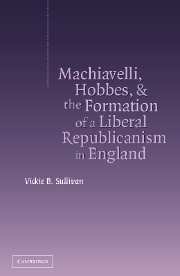Book contents
- Frontmatter
- Contents
- Acknowledgments
- Introduction
- PART I THE FOUNDATIONS OF LIBERAL REPUBLICANISM
- PART II THE FORMATION OF THE SYNTHESIS
- 3 Marchamont Nedham and the Beginnings of a Liberal Republicanism
- 4 The Distinctive Modern Republicanism of James Harrington
- 5 Henry Neville's Proposal for a Republic under the Form of Monarchy
- 6 Algernon Sidney as Anticipator of Locke and Secret Admirer of Machiavelli
- 7 Cato's Thought as the Reconciliation of Machiavellian Republicanism and Lockean Liberalism
- Conclusion
- Works Cited
- Index
3 - Marchamont Nedham and the Beginnings of a Liberal Republicanism
Published online by Cambridge University Press: 17 August 2009
- Frontmatter
- Contents
- Acknowledgments
- Introduction
- PART I THE FOUNDATIONS OF LIBERAL REPUBLICANISM
- PART II THE FORMATION OF THE SYNTHESIS
- 3 Marchamont Nedham and the Beginnings of a Liberal Republicanism
- 4 The Distinctive Modern Republicanism of James Harrington
- 5 Henry Neville's Proposal for a Republic under the Form of Monarchy
- 6 Algernon Sidney as Anticipator of Locke and Secret Admirer of Machiavelli
- 7 Cato's Thought as the Reconciliation of Machiavellian Republicanism and Lockean Liberalism
- Conclusion
- Works Cited
- Index
Summary
Never mistaken as a man of principle, Marchamont Nedham is famous for his astonishingly rapid changes in alliances, writing at different times in support of Parliament, king, and Cromwell during the English Civil Wars and Interregnum. He began his career as a journalist in 1643 by writing for Mercurius Britanicus, a parliamentary newspaper. As a consequence of his use of the newspaper to disseminate his mocking humor, which he aimed directly at the king, he went to jail. He then changed alliances just in time to be on the losing side, taking up the Royalist banner and editing Mercurius Pragmaticus beginning in 1647 and continuing through June of 1649, with a minor interruption in publication after the execution of Charles I. This episode ended with him again in jail, but this time his captors were the Parliamentarians. In order to win his freedom, he agreed to write a pamphlet supporting the fledgling government, and to edit a governmental newspaper. He fulfilled the latter agreement when, the next year, he published The Case of the Commonwealth of England, Stated and assumed the editorial duties of Mercurius Politicus, a newspaper that John Milton supervised for a time. His two treatises, The Case of the Commonwealth and The Excellencie of a Free State, would offer his editorials from this newspaper in a more coherent form. During the Protectorate, he served Cromwell in the capacity of a spy. Later, Nedham opposed the Restoration when it appeared a foregone conclusion, and finally fled to Holland.
- Type
- Chapter
- Information
- Publisher: Cambridge University PressPrint publication year: 2004



